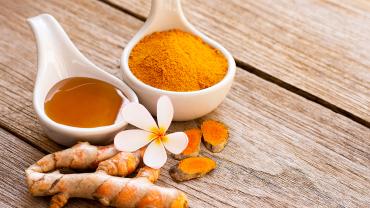
Curcumin is a natural compound known for its wide range of biological effects, including its potential anti-inflammatory, antioxidant, antitumor, antibacterial and antiviral properties. It is derived from the turmeric root, which is a bright yellow-orange spice that is popular as the main ingredient in Indian curry powders. Turmeric has three main bioactive components: curcumin, desmethoxycurcumin, and bisdemethoxycurcumin. Curcumin is the principal polyphenol of these three curcuminoids. Although turmeric has been used historically as a component of the traditional Indian medicine known as Ayurveda, research has identified curcumin as the agent responsible for most of the biological activity of turmeric.
In a previous article, we discussed the benefits of turmeric and curcumin supplementation on chronic inflammatory skin conditions. Other clinical studies have demonstrated that curcumin supplementation improves markers of dyslipidemia and inflammation in patients with diabetes.
According to a recent randomized double-blind, placebo-controlled human clinical trial published this month in Phytomedicine, researchers demonstrated the effects of curcumin supplementation on blood glucose, androgens, and insulin resistance in patients with polycystic ovary syndrome (PCOS). This condition is the most prevalent endocrine disorder and leading cause of infertility among women. Until now, the beneficial effects of curcumin supplementation on hormonal and glycemic parameters in PCOS have only been studied in animal models.
The study included 67 women of reproductive age who had a definitive PCOS diagnosis for at least 2 years with impaired glucose tolerance and symptoms of hirsutism. The participants were taking only one prescription medication (either metformin or clomiphene) and had a body mass index (BMI) between 25 and 30 kg/m2. The women were randomly assigned to the intervention group (n = 34) or the placebo group (n = 33) and were given 500 mg of curcumin powder or a placebo (maltodextrin) in capsule form to be taken three times per day for a total of 12 weeks. Researchers measured levels of fasting blood glucose (FBG), fasting insulin (FI), and sex hormones, along with anthropometric measurements. There were no significant differences in dietary parameters or physical activity levels between the groups at baseline or during the trial.
At the end of the 12-week study, FBG and dehydroepiandrosterone (DHEA) levels were significantly reduced (p = 0.033 and p = 0.035, respectively) in the intervention group compared to the controls. Although not statistically significant, estradiol levels increased in the intervention group and decreased in the control group. (Estradiol levels are the strongest of the estrogen hormones responsible for the maturation and maintenance of the female reproductive system, and specifically the maturation and release of the egg during the menstrual cycle.) There were no statistically significant effects between the two groups on the other primary and secondary outcome measures.
Various factors have been shown to play a role in the pathophysiology and maintenance of PCOS, including insulin resistance and hyperinsulinemia, obesity, and inflammatory diets. Pharmaceutical interventions provide some improvements, but they do not correct many of the underlying factors and they usually have side effects (such as micronutrient depletions) that may not be tolerated by all patients. In addition to anti-inflammatory and antioxidant-rich diets, supplementation with specific nutrients and phytochemicals may help support normal metabolic parameters associated with PCOS, as demonstrated in the current study. Quercetin, D-chiro-inositol, myo-inositol, omega-3 fatty acids from fish oil, and berberine may help promote normal insulin sensitivity and support a healthy inflammatory response in women with PCOS.
By Caitlin H. Higgins, MS, CNS, LDN